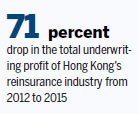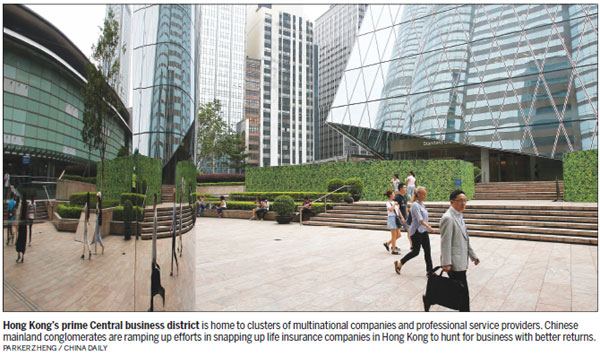Insurers fight it out on new 'battleground'
Updated: 2017-05-19 07:14
By Oswald chan in Hong Kong(HK Edition)
|
|||||||||
Mainland groups queue up to tap life insurance 'cash cows' in SAR's market
Closer economic integration between Hong Kong and the Chinese mainland in the past 20 years has tremendously enhanced the two-way flow of goods and services.
Both sides are seen to be making more reciprocal investments in each other's markets at an accelerated pace, and mainland companies are tipped to play an even bigger role in the SAR's economy.
It now seems nothing is out of the realm of cash-rich, asset-hungry mainland conglomerates, which have raised eyebrows in Hong Kong lately with their spectacular purchases of prime properties and development sites at record-shattering prices.
After real estate, Hong Kong's mature life insurance sector looks set to be their next "battleground" as mainland enterprises continue to unleash their vast wealth on the SAR, snapping up local life insurers in a setting that's poised to revolutionize the market.

Industry pundits see the city's life insurance market in the coming years being at the mercy of either foreign or full-of-beans mainland players. The thrust into Hong Kong has been amplified by a slew of mitigating factors - the surging mainland appetite for offshore insurance-linked products, the lust for hedging against a sliding renminbi, Hong Kong's stature as a mature insurance marketplace, and the fact that the mainland's own insurance trade has yet to see explosive growth despite rising personal income.
Traditionally, insurance companies have been the chief go-getters of life insurance assets in Hong Kong, but mainland buyers have now very much thrown down the gauntlet, with private equity funds, hedge funds, conglomerates and real estate titans joining the fray.
One of the first notable salvos was fired recently when mainland conglomerate China UCF Group, headed by prominent tycoon Zhang Zhenxin, wrestled over Hong Kong Life Insurance (HKIF) - one of the city's remaining independent life-insurance businesses founded 16 years ago by a consortium that included OCBC Wing Hang Bank, Asia Insurance, Shanghai Commercial Bank and Wing Lung Bank.
The HK$7.1 billion deal was clinched in March this year by First Origin International - the Hong Kong-based investment arm of China UCF.
Zhang, who's also the largest shareholder of Shanghai-based, Hong Kong-listed Credit China FinTech Holdings, runs businesses ranging from the provision of pawn loans, leasing and foreign exchange to online investment and property, with branches on the mainland and in Hong Kong, the UK and the US.
His purchase came less than a year after the mainland's Fujian Thai Hot Investment Co paid HK$10.6 billion in cash to Dah Sing Financial Holdings for the latter's life insurance business in Hong Kong and Macao.
The buyer is one of the founding shareholders of Haixia Life Insurance Co, as well as a major shareholder of Fujian Haixia Bank Co and Dongxing Securities Co.
"Mainland insurers are now looking to the US and other mature markets to gain access to know-how and capabilities in order to expand their domestic insurance infrastructure," a KPMG report on merger-and-acquisition activities of the insurance industry said in March.
"This is the business diversification strategy of mainland conglomerates as their other business lines on the mainland are highly vulnerable to any policy changes by the central government," commented Billy Mak Sui-choi, associate professor at Hong Kong Baptist University's Department of Finance and Decision Sciences.
"Financial services represent one of the important services sectors that mainland conglomerates will bet on in the future when the mainland economy becomes more services oriented," he told China Daily.
Mainland enterprises have come to realize that life insurance in Hong Kong is their "cash cow" against the backdrop of a growing number of mainland investors flocking to the SAR in search of life-insurance policies issued in the city. These products are seen as offering greater product choices and a safe haven amid a depreciating renminbi.
"From what I know, at least 10 mainland companies are applying for a license to conduct life insurance business in Hong Kong, indicating they're learning to tap the potential of the city's life-insurance business," said lawmaker Chan Kin-por, who represents the insurance sector in the Legislative Council.
"The trend will be that mainland finance and insurance companies won't be selling life-insurance policies merely to mainland customers in the onshore market - they're now relying more on the Hong Kong offshore market to do it," he said.
According to the Office of the Commissioner of Insurance, the revenue premiums of the individual life and annuity (non-linked) business soared 36.2 percent to HK$344.9 billion last year, while the individual life and annuity (linked) business fell 28.9 percent to HK$28.6 billion in the same period.
"The mainland insurance market has yet to witness explosive growth with the country's GDP per capita hovering around $8,000. However, if the GDP per capita level hits between $10,000 and $15,000, it could trigger explosive growth in the mainland's quest for insurance services," predicted Terence Chong Tai-leung, executive director at the Chinese University of Hong Kong's Institute of Global Economics and Finance.
"That explains why mainland conglomerates have jumped on the Hong Kong life insurance bandwagon for a good harvest in future," he told China Daily.
At the same time, overseas insurers are clamoring to dispose of their life-insurance units in Hong Kong, or very much tempted to do so when irresistible offers prop up.
In March this year, Edinburgh-based insurer Standard Life said it had agreed to sell its Hong Kong insurance business, Standard Life (Asia), to its joint venture company on the mainland - Heng An Standard Life Insurance Co.
Chong said he foresees Hong Kong's life-insurance sector being increasingly dominated by either foreign or mainland market players.
Analysts, however, have warned that the quality of life-insurance policies in Hong Kong will deteriorate along with services in future as mainland groups gain a firm hold on the industry.
"Once mainland bosses take over the life-insurance businesses, they've to follow the stringent requirements of the Independent Insurance Authority regarding actuarial officers, chief executive officers, risk managers and agent heads. The authority has laid down strict requirements concerning the solvency ratio and investment criteria for life insurance to protect investor interests," Chan noted.
oswald@chinadailyhk.com

(HK Edition 05/19/2017 page8)